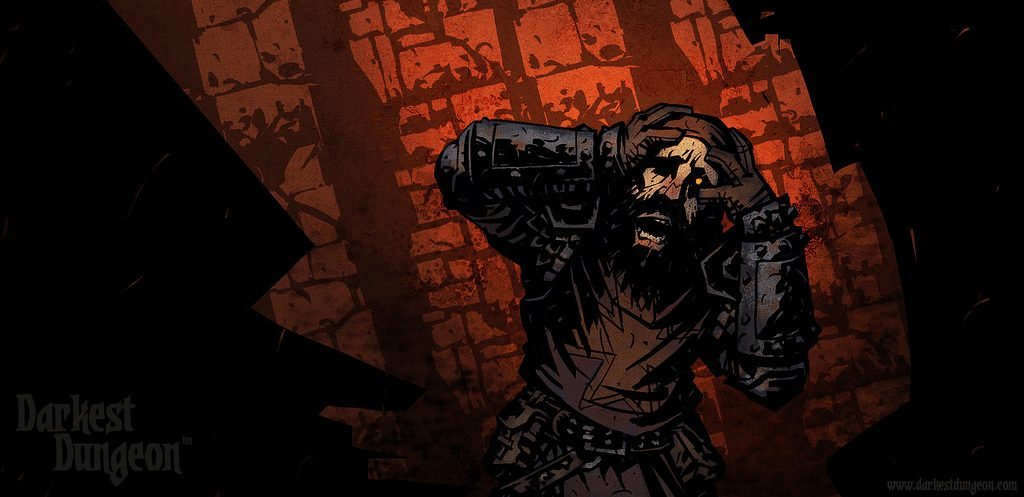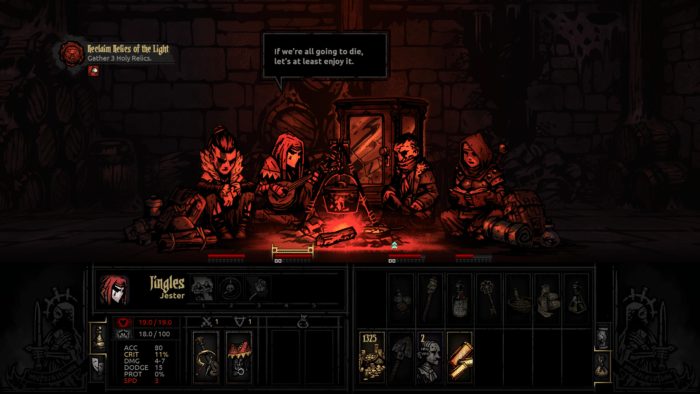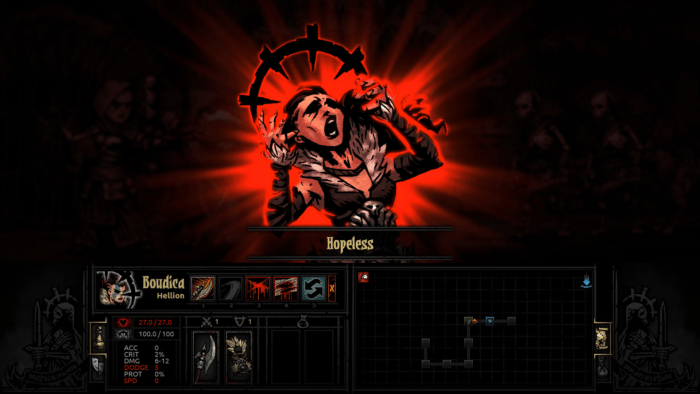Darkest Dungeon Review
Darkest Dungeon possesses a uniquely crushing sense of dread, the eldritch weight of which permeates everything from its art and sound design to the very mechanics that form the core of the game.
To describe Darkest Dungeon is to initially steep oneself in a standard formula of fantasy: “Your ancestral home has been overrun by monsters; only you can halt the end of the world; you must assemble a ragtag group of adventurers to fight back this brazen evil!” Only these monsters aren’t your granddaddy’s goblins or orcs; instead, they’re cultists, the bloated corpses of drowned pigs, and other indescribable abominations.
Likewise, your ragtag party are a mess of bloodthirsty jesters, grave robbers whose ideas of ‘me time’ amount to self-flagellation, and nymphomaniacal bounty hunters. Moreover, the black and hideous dankness of the dungeons themselves take their toll on your adventurers, pushing your adventurers to the limits of their sanity, and far beyond. These are fragile characters who quickly become selfish, cowardly, disobedient, and even start lashing out wildly at the rest of your party. The dreadful charm of Darkest Dungeon is that it only gets worse from there.
The average run in a dungeon is a frustrating and stressful affair, characters quickly descending into bickering and infighting as wave after wave of foes take their toll on their sanity and will to survive. Preparation is everything, with party positioning and resource management being of particular importance, and yet an unlucky roll of the die can still seal your fate. However, these mechanics only make the taste of success sweeter. Critical hits and pieces of good luck feel compelling because real weight is placed behind them, they are made the exception, rather than the norm; it’s the kind of game that gets under your skin, under your fingernails, every defeat or scraped victory providing an endorphin rush that keeps you coming back for one last shot, one last crack of the whip.
Preparation is everything, with party positioning and resource management being of particular importance, and yet an unlucky roll of the die can still seal your fate.
It helps that the sound design is superb, a particularly purple narrator announcing every button press as a “thunderous blow” or “another step towards damnation” and giving every fight the feel of some long forgotten prose novel or pulp horror comic. This sensation is reinforced by the art too, a beautiful comic book tapestry bursting with character and identity, making each new party member or enemy feel like their own reward (before they quickly and efficiently kick your ass).
Where the game begins to slow down is in its known quantities, once you feel like you’re going through the motions: waiting for timers to finish ticking away so that you can use your best characters; going into dungeons knowing that nothing will ever harm you. Whilst the game does take steps to alleviate the feeling of repetition with new characters to level up and new dungeon variants to explore, my excitement started to wane around the middle of the game. Pushing through, however, will unlock the titular Darkest Dungeon, and, hoo boy, does that elevate the game to new levels of terror.
Many comparisons are made between the Dark Souls series and Darkest Dungeon, because the barrier to entry is so high and the atmosphere is steeped in the same dark fantasy. But, to me, it falls on a completely different end of the spectrum. Dark Souls has a kind of throwaway risk; yes, you die, and you’ll die over and over, but your resources remain the same, your character becomes no weaker, and the only thing you’ll really lose is time as you trek your way back to where you fell. Darkest Dungeon, by contrast, thrives on real stakes, such as consumables, health, and the very sanity of your characters.
As more stress is placed on your characters, the player’s own stress is elevated which creates a more immersive, nail-biting experience. This is especially obvious in the way that the game’s permadeath mechanics create more emotional investment in your characters than I’ve felt in countless one hundred hour RPGs hundreds of hours longer than Darkest Dungeon.
If you want to distract yourself from your own problems by purchasing a whole new wave of fictional problems and puzzles to solve, it’s definitely worth the £15 asking price.



Comments